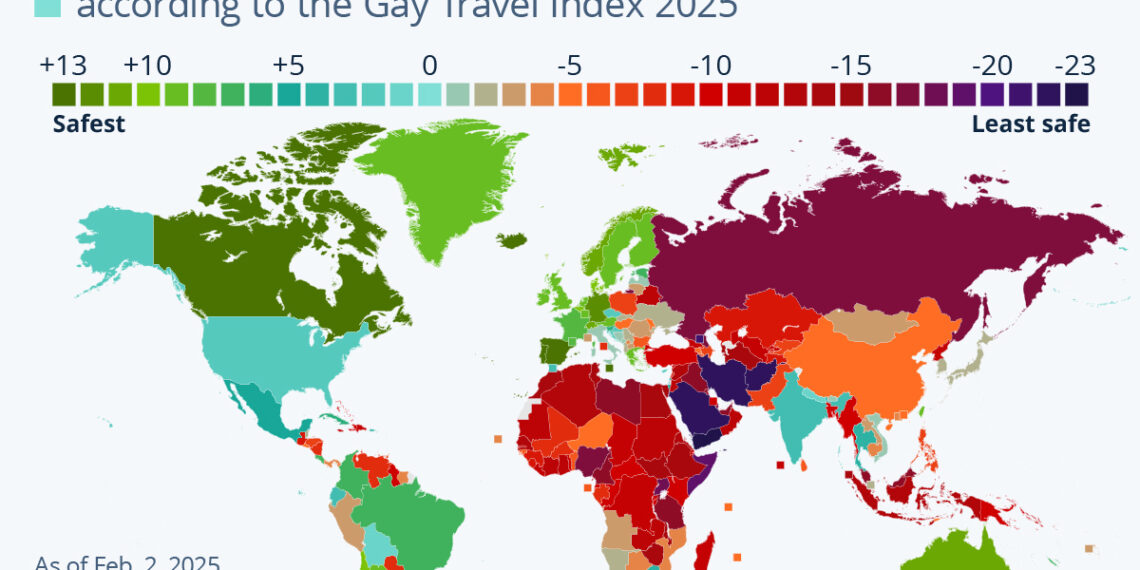Select Language:
Understanding the LGBTQ+ Travel Index: A Comprehensive Overview
The journey for LGBTQ+ travelers has evolved significantly over the years, with many countries taking steps toward equality while others remain perilous. The Spartacus Gay Travel Index serves as a critical tool for assessing the safety and openness of countries for LGBTQ+ individuals. This blog delves into the findings from the 2025 edition, showcasing both safe havens and risk-prone destinations.
The Gay Travel Index: A Brief Introduction
The German-based portal Spartacus has been publishing the Gay Travel Index since 2012, aimed at empowering LGBTQ+ tourists with essential information regarding their safety while traveling. The 2025 edition encompasses a vast analysis of 215 countries and territories, evaluating their social, legal, and political landscapes to determine how supportive or dangerous these locations are for LGBTQ+ individuals.
Top Destinations for LGBTQ+ Travelers
According to the latest index, five countries have earned the distinction of being the safest and most welcoming for LGBTQ+ travelers in 2025, each scoring the maximum of 13 points:
Canada
Known for its diverse population and progressive policies, Canada continues to stand as a beacon of equality. Its supportive legislative framework ensures that LGBTQ+ individuals are embraced, making it a prime destination for those seeking a welcoming atmosphere.
Iceland
With its rich culture and natural beauty, Iceland also champions LGBTQ+ rights. The nation’s commitment to equality shines through its legal protections and social acceptance, further solidifying its status as a top travel destination for the community.
Malta
Malta has made significant strides in recent years, enacting laws that foster inclusivity for LGBTQ+ individuals. The island nation combines stunning landscapes with a progressive social climate, attracting many travelers looking for a safe haven.
Portugal
Portugal’s charming cities and stunning coastline perfectly complement its reputation for safety and acceptance of LGBTQ+ travelers. The country’s legal reforms have established a hospitable environment for all.
Spain
Famed for its vibrant culture and festivals, Spain also ranks among the top destinations for LGBTQ+ individuals. The nation’s proactive stance on LGBTQ+ rights reflects its commitment to fostering a welcoming atmosphere.
Countries Making Significant Progress
Several countries are noted for their improvements in LGBTQ+ rights, indicative of broader social change. Greece, Thailand, and Curaçao have all made notable advancements:
Greece
Rising dramatically from 38th to 15th place, Greece has embraced marriage equality, reflecting a significant societal shift. This progress marks a positive change in an area historically challenged by conservative attitudes.
Thailand
As the first Southeast Asian country to grant same-sex partnerships legal recognition equivalent to heterosexual marriage, Thailand’s ascent from 54th to 41st position signifies a breakthrough in regional attitudes toward LGBTQ+ rights.
Curaçao
With a rise from 70th to 58th place, Curaçao is making headway in LGBTQ+ rights, demonstrating the potential for growth and acceptance within Caribbean nations.
The Most Dangerous Countries for LGBTQ+ Travelers
Conversely, some countries present stark risks for LGBTQ+ travelers. The index highlights the following nations as particularly perilous:
Republic of Chechnya (Russia)
Chechnya ranks at the bottom, illustrating an environment of intense persecution and violence against LGBTQ+ individuals. The dire circumstances here warn travelers of the serious risks involved.
Afghanistan
Having faced considerable turmoil, Afghanistan is another country where LGBTQ+ individuals are at extreme risk, facing severe discrimination and violence.
Iran
Iran continues to have a grim reputation for LGBTQ+ rights, with laws that criminalize same-sex relationships, making it an unsafe destination.
Saudi Arabia and Yemen
Both countries score extremely low on the index, reflecting a severe lack of tolerance for LGBTQ+ identities. Laws in place not only ostracize but can also lead to life-threatening situations for individuals.
Changes in the U.S. Ranking and Other Shifts
The United States has seen a decline in its ranking, dropping from 41st to 48th place. This shift can be attributed to regressive policies during the previous administration, particularly concerning transgender rights. Moreover, Georgia’s steep fall from 109th to 162nd position underscores the adverse effects of regional political pressures, especially from influential neighboring countries.
Methodology of the Index
The Gay Travel Index assesses a multitude of factors—18 categories in total—that include marriage equality, legal recognition, and instances of violence against LGBTQ+ individuals. This thorough approach ensures a comprehensive understanding of the political and social climates affecting LGBTQ+ rights across the globe.
Purpose of the Index
The intention behind the Spartacus Gay Travel Index is to cater to every type of traveler—whether they seek a warm, inclusive environment or wish to engage with local communities that face oppression. This resource empowers individuals to make informed choices, ensuring that their travel experiences are both rewarding and safe.
Understanding the landscape of LGBTQ+ rights around the world is essential for fostering global acceptance and encouraging dialogue about inclusion and equality. With resources like the Gay Travel Index, travelers can navigate their journeys with greater insight and awareness.







